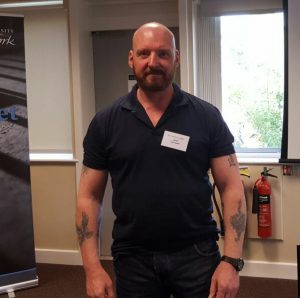Voices of the lived experience
Written by Dr Dave Honeywell, Research Assistant, PROSPECT project
From being a former prisoner and mental health patient, to being on the other side of the fence (pardon the pun) and working in a professional capacity is an honour to say the least. That said, it can bring with it many other challenges such as a divided identity where you belong within two places at the same time. Managing a dual identity can be difficult and sometimes confusing, but there seems to be an increasing interest from organisations such as universities, mental health charities, and even prisons (to name a few) to hear the voices of people with the lived experience of the criminal justice system and mental health services.
This is why I was particularly drawn to a recent conference, ‘What Good Looks Like – a national partnership approach to supporting those in prison at risk of self-harm and suicide’ on October 2nd, 2020. This was the first joint HMPPS and NHSE national event that I attended in my capacity as the lived experience Research Assistant for the PROSPECT project.
The conference took place online, via Microsoft Teams, and there was a huge turnout. The keynote speakers were led by Phil Copple, Director General of Prisons, who discussed the increased risk of suicide and self-harm amongst people in prison during the COVID-19 pandemic and related lockdown. He added that the levels of self-harm remain troublingly high, especially amongst the female prison estate. This was then followed by Martin Sullivan who shared his lived experience of time spent in prison and in a secure mental health hospital. His experiences began from the age of nine to the age of thirty-seven and he now contributes to various organisations, by sharing his experiences, to help support service users and inform relevant criminal justice agencies. Sue McAllister, Prisons and Probation Ombudsman, talked about the probation service, and Professor Warren Larkin, Consultant Clinical Psychologist, gave a presentation about Adverse Childhood Experiences (ACES).
I could see from the constant stream of comments in the Teams chat how much of an impact Martin’s lived experience talk had on the audience, and I felt a sort of pride that someone from Martin’s background was given such a prestigious platform. The questions came thick and fast, which made the administrators job quite demanding!
The panel asked Martin what he might say to his younger self. He responded:
“Young people are getting all the wrong information about how cool it is being a criminal. They have preconceived ideas that is all nonsense.”
It was also interesting to hear that Martin wrote a letter to himself during his time in prison of how he wanted to change. This is something I can relate to as I’m sure many other prisoners and ex-prisoners can, where writing something enables you to get everything out from inside your head and on to paper. Not everyone in prison have the privilege of being able to write but there most certainly needs to be a conversation between prisoners and mentors about how they want to change. This could be with a prison officer, probation officer, or education officer, for example. For some, the best person to have meaningful conversations with is the prison Chaplain, so when someone asked how the role of the prison chaplain could be used in the risk assessment of prisoners, Probation Ombudsman, Sue McAllister, said: “I can’t see why Chaplains can’t be involved in risk assessment. They should be able to contribute to risk assessment”.
Not too long ago, people like us had no voice, so this approach of involving people with lived experience is a welcome development, and when reading the response from the conference audience, was very well received. The mixture of such diverse backgrounds and topics really made the conference special, with contributions from probation officers, prison inspectors, and clinicians, to Martin, who bravely and generously laid his past to bare. Each perspective complimented the other, and the ongoing communication between delegates via Twitter added to excitement of the conversation.
This was not just about offering invaluable insights to practitioners in the field of justice and mental health, but it felt like a defining moment for other ex-service users. Martin gave an enthralling insight into his life struggles and how he has managed to make a complete transition to doing the work he does now which includes talks and workshops in prisons and hospitals. Martin’s and my own experiences are in many ways worlds apart, but I am reassured to see how the voices of those who have lived experiences on both sides of the fence are now being given their own platform.
See Martin’s story: https://www.lancs.live/news/lancashire-news/convicted-preston-criminal-overcame-schizophrenia-16281521
About Dr Dave Honeywell:

Dr Dave Honeywell
Dr David Honeywell is a Lived Experience Research Assistant at the University of Manchester currently working on a project on prison suicide. David began his academic career in 2013 at the University of York where he worked as an Associate Criminology Lecturer alongside studying for a PhD. He has since taught criminology at Leeds Beckett University and the universities of Durham and Hull. In 2018, he completed his PhD in sociology about ex-prisoners and the transformation of self through higher education which was inspired by his own personal journey as an ex- prisoner who escaped a dysfunctional life through learning. While in prison in the 1990’s he gained an Open University qualification which later led to degrees in criminology, social research methods and sociology. After a 10-year break from study he returned to university following the publication of his autobiography Never Ending Circles which was inspired by the aftermath of the 2011 London riots. His book led to an ongoing career as a guest speaker and visiting lecturer on the university circuit.
